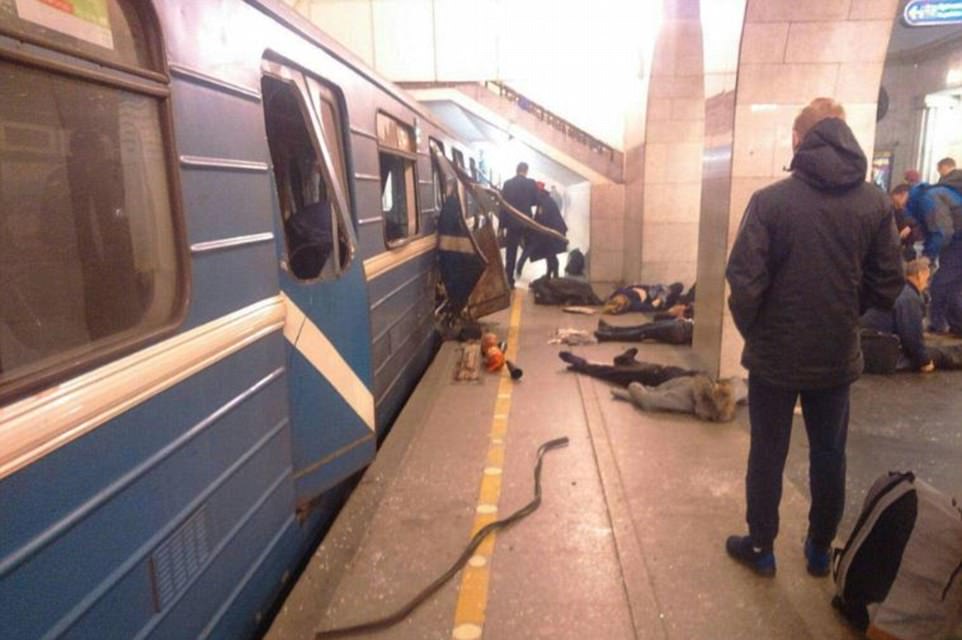
St Petersburg, Russia - A nail bomb thrown onto a train by a suspected terrorist has ripped through a carriage in St Petersburg killing at least 12 people and injuring 50 more today. The terrifying incident, which is being investigated as a terror attack, took place on a train that was travelling between Sennaya Ploshchad and Sadovaya metro stations. The attack has left dozens injured, including children, and witnesses described seeing a man throwing a backpack onto the train moments before the explosion and a second explosive device was found and made safe in a nearby station. Vladimir Putin is in his hometown of St Petersburg today for talks with the president of Belarus and has confirmed 'there are dead and injured' and offered his condolences to the families of those killed. The Kremlin leader, who wanted to visit the scene in the aftermath of the attack but was held back by security services, said: 'I have already spoken to the head of our special services, they are working to ascertain the cause of the blasts. 'The causes are not clear, it's too early. We will look at all possible causes, terrorism as well as common crime.' Kremlin spokesman Dmitry Peskov denied earlier speculation that President Putin was due to pass by the Sennaya Metro station around the time of the blast. The explosion happened between the Sennaya Ploshchad station and Tekhnologichesky Institut at around 2.40pm local time, Russia’s National Anti-Terrorism Committee said. Earlier reports had suggested there had been multiple explosions, but officials confirmed just the one blast. Russian security agencies did find an explosive device at a different metro station in central St Petersburg and made it safe, the National Anti-Terrorist Committee said in a statement. The device was found at the Ploshchad Vosstaniya metro station, a different location from where a blast earlier took place. Other witnesses also described a man leaving a briefcase on one carriage before moving to another just seconds before the huge explosion. As reports of the suspected terror attack trickled through to the capital, Moscow heightened its security and local reports suggest three metro stations - Nagatinskaja, Savelovskaya and Ugrezhskaya (CIP) - were cordoned off due to suspicious packages. A witnesses told Russia's Life News: 'People were bleeding, their hair burned. We were told to move to the exit, because the movement stopped. People just fled. 'My girlfriend was in the next car that exploded. She said that he began to shake. When she came out, she saw that people were mutilated.' Eight bodies were recovered from the carriage while two more were found on the platform and the final two killed were found in the tunnel. Russian President Vladimir Putin says investigators are examining all causes for the blast in St Petersburg today - including terrorism. And while no-one has yet come forward to claim responsibility, the country's security services have previously said they had foiled 'terrorist attacks' on Moscow's public transport system by militants. Russia has been targeted by different groups in the past and it is not the first time the country's transport system has been hit. In the past, deadly raids have been carried out by Chechen militants with rebel leaders threatening further attacks. But Russia, which has provided military backing to Syrian president Bashar al-Assad, has also stepped up security in major cities amid fears of an ISIS atrocity. In 2015, the terror group claimed responsibility for a bomb blast on a MetroJet plane from Egypt to St Petersburg which killed all 217 on board.
The country has also been the target of attacks by Chechen militants. At least 38 people were killed in 2010 when two female suicide bombers detonated bombs on packed Moscow metro trains. Over 330 people, half of them children, were killed in 2004 when police stormed a school in southern Russia after a hostage taking by Islamist militants. In 2002, 120 hostages were killed when police stormed a Moscow theatre to end another hostage taking. Chechnya was the scene of two separatist wars in the 1990s and early 2000s, but violence in the region has largely been suppressed under the iron-fisted rule of strongman leader Ramzan Kadyrov. Putin, as prime minister, launched a 1999 campaign to crush a separatist government in the Muslim southern region of Chechnya, and as president continued a hard line in suppressing rebellion. Over the weekend, Russia said it had detained one of the attackers who carried out a deadly strike on a military base in Chechnya. A 21-year-old local man has been held over last week's attack, in which six soldiers and six rebels died.
ISIS claimed responsibility for the March 24 attack, which targeted a base of Russia's National Guard, a new branch of troops which answers directly to President Vladimir Putin and is tasked with defending borders and counter extremism.(FA)


